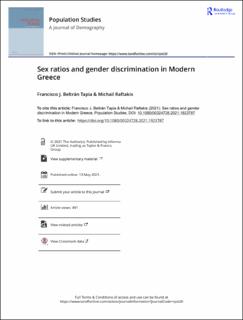Sex ratios and gender discrimination in Modern Greece
Peer reviewed, Journal article
Published version
Permanent lenke
https://hdl.handle.net/11250/2825515Utgivelsesdato
2021Metadata
Vis full innførselSamlinger
Originalversjon
https://doi.org/10.1080/00324728.2021.1923787Sammendrag
This paper argues that son preference resulted in gender-based discriminatory practices that unduly increased mortality rates for females at birth and throughout infancy and childhood in nineteenth- and early-twentieth-century Greece. The relative numbers of boys and girls at birth was extremely high and under-registration of females cannot on its own explain this result. The infanticide and/or mortal neglect of infant girls was therefore more common than previously acknowledged. Likewise, sex ratios increased as children grew older, thus suggesting that parents continued to treat boys and girls differently throughout childhood. A large body of qualitative evidence (contemporary accounts, folklore traditions, feminist newspapers, and anthropological studies) further supports the conclusion that girls were neglected due to their inferior status in society.

